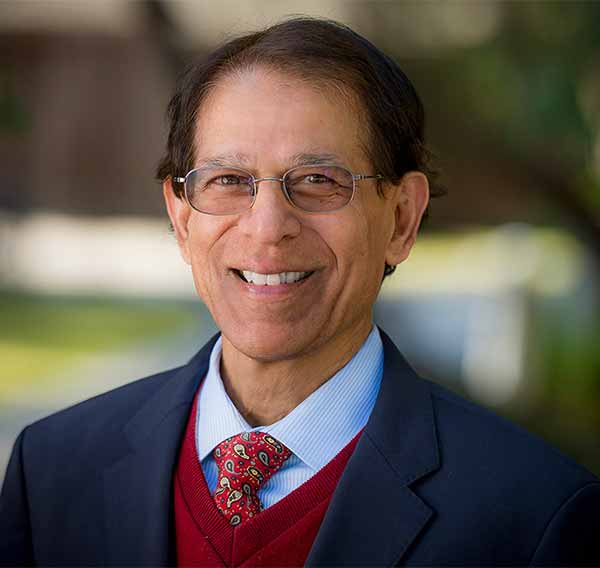Healthy Aging Initiative at UC San Diego Announces Inaugural Research Projects
Published Date
By:
- Micah Siegel
Share This:
Article Content
The Healthy Aging Initiative (HAI), a campus-wide effort to investigate and address the diverse challenges and needs of the nation’s aging population, has announced its inaugural research and education seed grants to seven University of California, San Diego faculty members.

Dilip Jeste
The grants, totaling $160,000, will provide pilot funding for interdisciplinary projects that enhance understanding of and improve the aging process. Recipients represent various schools, divisions, and departments across UC San Diego. Funds for the projects were contributed by the School of Medicine, the Skaggs School of Pharmacy and Pharmaceutical Sciences, the Kavli Institute for Brain and Mind, Qualcomm Institute, Stein Institute for Research on Aging, the Institute of Engineering in Medicine (IEM), and the divisions of Biological Sciences and Social Sciences.
“The scope of these pilot projects reflects the broad-based and diverse needs and issues related to aging and aging well,” said Dilip Jeste, MD, Distinguished Professor of Psychiatry and Neurosciences and director of the Center for Healthy Aging, which is organizing this Initiative.
“More than 10,000 Baby Boomers turn 65 every day. Peop le age 85 and older represent the fastest growing segment of the U.S. population. Healthy aging is about more than medicine and health care. It encompasses physical, cognitive, psychological and social-cultural qualities of life and well-being. Issues like housing, technology and community all bear significant impact upon our later years.”
Jeste said the seed grants, with funding up to $25,000, will stimulate innovative aging-related research that is not currently supported by standard funding streams. It’s hoped the preliminary data generated will spark additional funding and support from other sources. Recipients will present their HAI research at a symposium on healthy aging, slated for May 26, 2016.
The seed grants, recipients and their disciplines are:
- Regulation of Synapse Function by Septin Rings in Health and Alzheimer's Disease. Principal investigators: Brenda L. Bloodgood (Neurobiology), Mark Ellisman (Neurosciences and Bioengineering) and Maho Niwa (Molecular Biology)
- A Pilot Trial to Evaluate the Utility of Integrating Visual and Electrophysiological Measures of Movement to Understand and Reduce Injury Prone Behavior to Promote Healthy Aging. PIs: Todd P. Coleman (Bioengineering), Elaine Tanaka (Surgery)
- Targeting Electrophilic Stress for Healthy Aging. PIs: Mohit Jain (Pharmacology), Jehad Almaliti (Pharmaceutical Sciences) and Aitor Aguirre (Medicine)
- IL-17 Signaling Regulates Age-Related Changes of Liver-Brain Axis. PIs: Tatiana Kisseleva (Surgery), Sheng Zhong (Bioengineering) and Cedric Geoffroy (Neurosciences)
- Life Course Scholars Program. PIs: Leslie R. Lewis (Urban Studies & Planning), Jeanne Ferrante (Computer Science and Engineering) and Mirle Rabinowitz Bussell (Urban Studies & Planning
- Design Competition to Improve the Quality-of-Life for Seniors. PIs: Truong Nguyen (Electrical and Computer Engineering), Maria Marquine (Psychiatry) and Don Norman (The Design Lab)
- Can Acupuncture Decrease Stress and Increase Telomerase Activity to Promote Healthy Cellular Aging? PIs: Amy L. Non (Anthropology), Laura Redwine (Psychiatry) and Nikki Rodney (Classical Chinese Medicine)
Shu Chien, PhD, professor of bioengineering and IEM director, said the projects embrace compelling scientific, engineering and societal concerns. “The mission of the Institute of Engineering in Medicine is to apply engineering principles and technologies to advance people’s health and health care through interdisciplinary research and translation. It is most encouraging that there were nearly 50 proposals at the first trial. I strongly believe that these grants will synergize the remarkable strengths in different disciplines on our campus to develop innovative approaches to enhance healthy aging.”
Share This:
You May Also Like
Stay in the Know
Keep up with all the latest from UC San Diego. Subscribe to the newsletter today.



